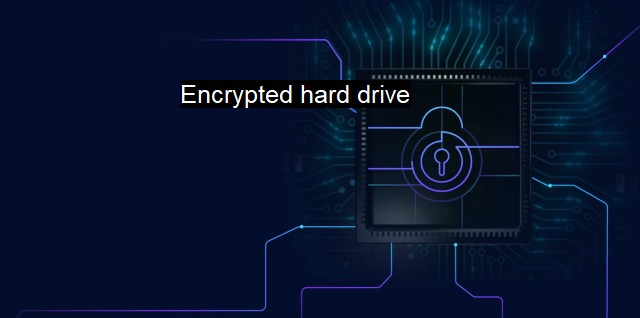What is Encrypted hard drive?
Protecting Sensitive Data: The Importance of Encrypted Hard Drives in Today's World of Cyber Threats
An encrypted hard drive is a storage device where data is converted into a code to prevent unauthorized access. Having a hard drive with encrypted data has become a critical aspect of computing technology and information systems. The primary goal of hard drive encryption is the secure preservation of information to keep it confidential. In the era of increasing technological advancements, the focus on cybersecurity has magnified, and correctly so, given the sophisticated threats users and organizations face. Systems can be compromised and vulnerable at many levels, with hard drives providing a vital entry point for cyber attackers. That's why an encrypted hard drive has become essential in the maintenance of information security and management.How does the process of hard drive encryption work? Encryption generally refers to the process through which plain text or any form of readable data is converted into code – encrypted data known as cipher text. In hard drive encryption, the data stored in the hard drive undergoes this process. This encryption could either be full disk encryption, where every bit of data on the drive gets encoded, or single file or folder encryption, where specific data is encrypted.
An encrypted hard drive ensures comprehensive data protection by creating a virtual fortress around the sensitive data, so even if a device were lost or stolen, the data could not be accessed. It serves as a bold pointer that cybercriminals cannot devastate the system through the avenue of encrypted hard drives. Should the hard drive be extracted, these encrypted files become virtually unreadable, only appearing as random gibberish to anyone without the proper decryption key.
Encryption of a hard drive goes hand in hand with antivirus programs to provide more concrete data security. Antivirus software is essential in the protection against malicious software that could harm your computer or compromise your personal information. Traditional antivirus software commonly offers protection against known viruses and regularly scans your system for these threats. Modern antivirus solutions have risen to a higher standard and can now deal with complex threats like rootkits, trojans, and even ransomware.
While antivirus software works to detect and eradicate the incoming threats, an encrypted hard drive aims at internal protection that won't let the data escape in a readable format even if the system is breached. They form a pool of security layers working together to enhance the level of protection already in place. In this way, encryption serves as another layer of security that bolsters the antivirus software, thus dynamically maximizing the overall protection of data stored in a hard drive and hence minimizing the probability of successful cyberattacks.
An encrypted hard drive offers a strong shield of protection against unauthorized data access, whether the attempt is made by individuals or automated software. The synergy between hard drive encryption and antivirus software presents us with an enhanced defense against the pressures of the cyber world. It is a critical component of any self-respecting cybersecurity strategy. Given the explosive growth of data in the digital age and the rising levels of cyber threats and criminal sophistication, adopting such combined defense strategies is truly vital.

Encrypted hard drive FAQs
What is an encrypted hard drive and why is it important for cybersecurity?
An encrypted hard drive is a type of storage device that uses encryption technology to protect data from unauthorized access. It is important for cybersecurity because it ensures that sensitive information cannot be accessed by hackers or other malicious entities in the event that the device is lost or stolen.How does encryption work on a hard drive?
Encryption on a hard drive involves converting data into a code that can only be deciphered with the correct key or password. This makes it virtually impossible for anyone without the key to access the information on the drive. There are a variety of encryption methods, but some of the most common include AES, Blowfish, and Twofish.Can antivirus software detect and remove malware on an encrypted hard drive?
Antivirus software can detect and remove malware on an encrypted hard drive, but it may not be able to fully protect the drive from all types of attacks. Some malware can bypass antivirus software and access the drive directly, so it is important to use multiple layers of protection to safeguard sensitive data.Is it possible to recover data from a damaged or corrupted encrypted hard drive?
Recovering data from a damaged or corrupted encrypted hard drive can be difficult or impossible without the correct key or password. However, there are specialized data recovery services that may be able to recover some or all of the data on the drive. It is important to keep backups of important data to avoid losing it permanently in the event of a hardware failure.| | A | | | B | | | C | | | D | | | E | | | F | | | G | | | H | | | I | | | J | | | K | | | L | | | M | |
| | N | | | O | | | P | | | Q | | | R | | | S | | | T | | | U | | | V | | | W | | | X | | | Y | | | Z | |
| | 1 | | | 2 | | | 3 | | | 4 | | | 7 | | | 8 | | |||||||